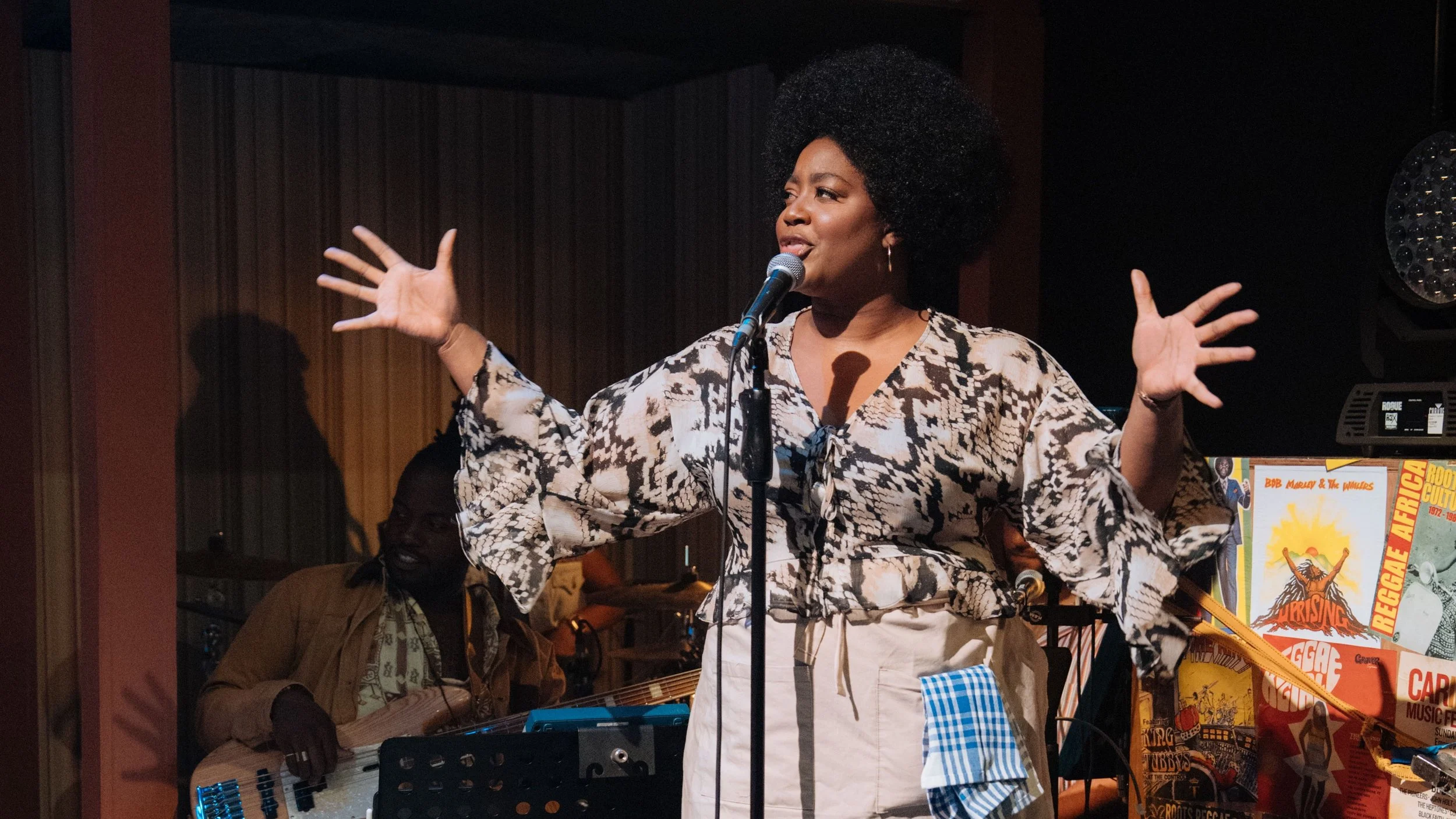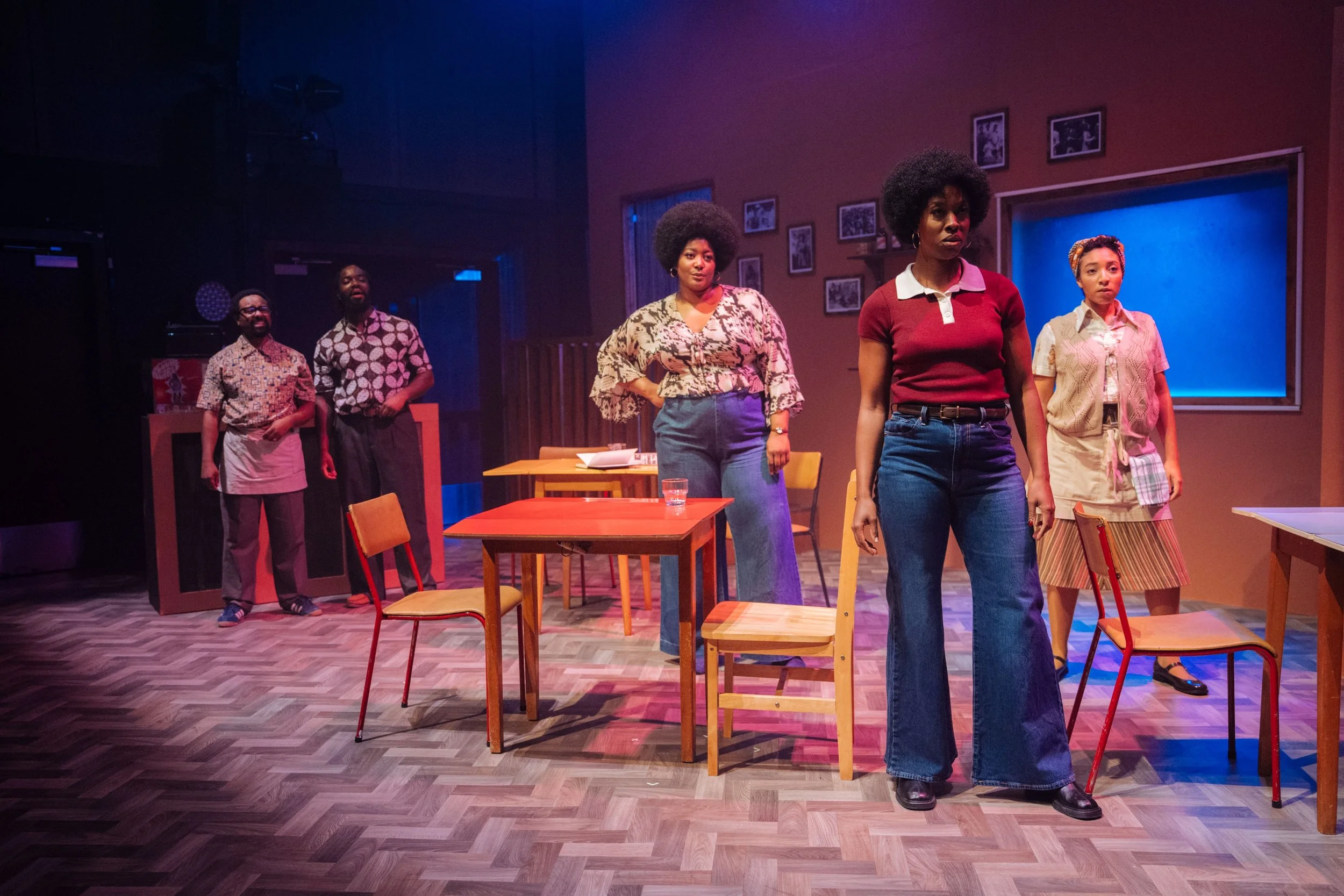Black Power Desk by Urielle Klein-Mekongo – ★★★★☆
The moment we were born black, was the moment politics became our faith.
Black Power Desk is a dynamic, and entertaining demonstration of the mantra; “the personal is political”. Taking us behind the scenes of the black civil rights movements in 1970s London, we discover the stories of regular people whose lives are upheaved by the racism and discrimination rampant in Britain at the time, forcing them to become activists, heroes and sometimes villains, in their own right.
A vibrant musical, with original music composed by Urielle Klein-Mekongo, Gerel Falconer and Renell Shaw, it shines a light on a pivotal era of Black British History, a topic usually overlooked, that often leaves the victories of the pioneers that came before us unsung. Black Power Desk not only gives them posterity, but adds colour and light to what was a dark time for Black Brits.
Celia (Rochelle Rose) and Dina (Veronica Carabai) are two sisters, seemingly polar opposites, but burning with the level of passion and love for each other. Where Dina’s focus is on the bettering of black people, becoming the leader of the British Black Panthers, Celia “doesn’t do politics” and instead seeks comfort and stability in the idea of family. They are surrounded by friends and family: Chanté Faucher plays Maya, fiercely loyal and headstrong wife of Carlton played by Gerel Falconer, the owner of the Drum, the restaurant that serves as a base for the British Black Panthers. Jarvis, played by Alexander Bellinfantie is Dina’s devoted, partner, and Faha Shaft rounds up the group as Colin, a smooth-talking, pompous man of the streets, who believes that the black power movement in Britain has been hijacked by women and endeavours to take matters into his own hands.
The Drum, and the group that inhabit it, come under the attack of the Black Power Desk made up of Officer Marks (Casey Bird), Officer Pullen (Alan Drake) and the duplicitous Jack (Tomos Eames), a police division assembled with the sole purpose of dismantling the Black Power Movement by means of undercover surveillance, fabrication and general wickedness. Between dealing with issues with each other, and dealing with a battle for the right to exist in the country they call home, we watch the characters navigate life at the axis of being black and being British. The intricate lives and relationships of the characters feel authentic, and serve as a reminder that behind the powerhouse of the Black Power, were real people whose lives were subject to the same trivialities as we would today.
The music was performed beautifully. The combined talents of the cast and the instrumentalists lit up the theatre, and peppered the story with musical numbers that were both touching and thrilling. The women are complex, strong-willed and powerful, different from each other but united when it counts the most. The intersectionality of being black and female is a prevalent theme in the play, and Klein-Mekongo ensures that the voices of the women who fronted the movement are not stifled, but rather front and centre. There are poignant scenes depicting the specific struggles women face, and handled with grace and care by the cast and Gbolahan Obisesan’s direction.
Black Power Desk is not perfect. There was a general feeling that the play should have ended sooner into its second half, and its ending felt somewhat drawn out, with a number of songs feeling like they were just fillers to move the story along. However, even these parts of the play were still moving, and performed brilliantly. The lights, soundscapes and movement come together to create what is truly a heartfelt show.
The final scene feels like it’s coming from the hearts of the actors, and not just the characters, inviting the audience to feel, and to breathe and release. A celebration of Black British History, timely and sincere, Black Power Desk will stay with you for a while.
★★★★☆
By Melody Adebisi

